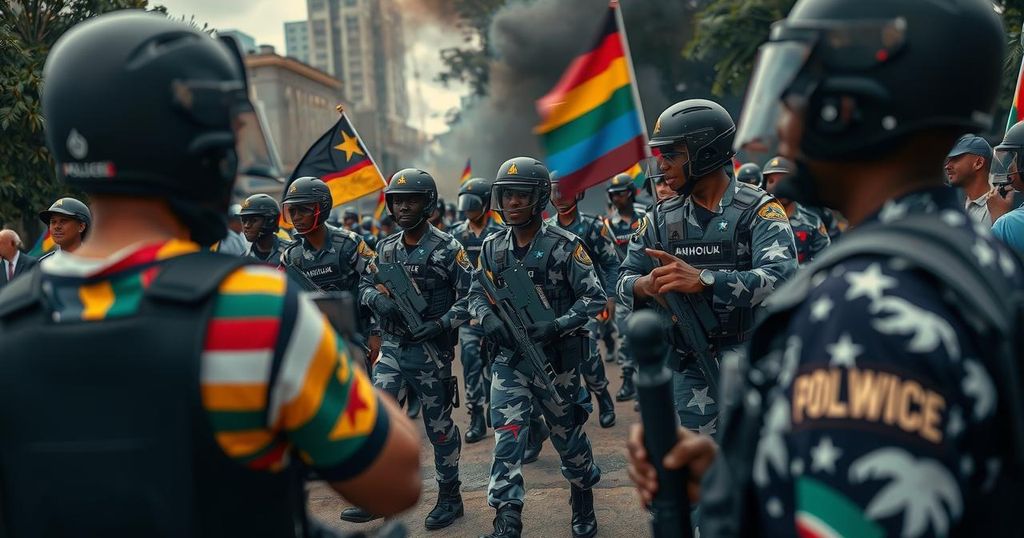Mozambique’s Election Crisis: Tragic Consequences of Protest Against Ruling Party

In the aftermath of a disputed presidential election in Mozambique, protests against the ruling Frelimo party turned violent, resulting in multiple fatalities, including children. The protests, sparked by claims of election rigging, reflect deep dissatisfaction amongst the youth regarding governance and economic opportunities. Eyewitness accounts indicate police brutality against demonstrators, raising significant concerns about human rights violations and the state’s handling of dissent.
In Maputo, Mozambique, a wave of protests erupted following the controversial declaration of the ruling Frelimo party as the winner of the recent presidential elections. Tragically, the demonstrations turned deadly when Antonio Juaqim, a 16-year-old boy, was shot during a pot-banging protest organized against the election results. Eyewitness accounts suggest police opened fire on protesters, leading to multiple fatalities, including children among the victims. The unrest has highlighted the intensifying discontent among the populace, particularly younger citizens, regarding the political climate and the perceived corruption within the electoral process. With at least 40 individuals reported dead and many others injured, the protests underscore a growing rift between the government and its critics, calling into question the legitimacy of the electoral system and the state’s response to dissent.
The political turmoil in Mozambique, marked by the electoral victory of Frelimo, reflects deep-seated issues within the nation. After winning the vote with 71 percent, the party faced accusations from opposition leader Venâncio Mondlane, who claimed the election was rigged. The protests began shortly after the election results were announced, with supporters of Mondlane adopting symbolic acts of defiance, such as banging pots and pans as a form of protest against the continued rule of Frelimo, which has been in power for nearly half a century. The situation escalated, resulting in violent confrontations between police and demonstrators. The grim aftermath included numerous casualties and growing calls for accountability and justice for the victims of police violence, particularly among the youth who seek economic opportunities and political representation.
Mozambique’s challenges stem from a long history marked by conflict and a struggle for democracy. Since gaining independence in 1975, the nation has grappled with governance issues, economic hardship, and limited opportunities for many citizens, especially the youth. The recent election irregularities have reignited frustrations, as young people demand political and financial independence rather than mere historical legacy. Furthermore, the tragic loss of life during the protests has become a poignant symbol of a generation caught between a divisive political atmosphere and a desire for change. The government’s response to these demonstrations, including the deployment of police force, has raised concerns regarding human rights and the preservation of civil liberties in Mozambique.
“Antonio was shot in the mouth, and the bullet went through the back of his head” – Manuel Samuel.
“At the morgue I counted six bodies of young children” – Manuel Samuel.
“It feels as though they are being used to protect the ruling party” – Albino Forquilha.
“They don’t care about who brought independence. The independence they want is their financial independence” – Borges Nhamirre.
“We are an organised party that prepares its victories” – Daniel Chapo.
The recent electoral crisis in Mozambique has its roots in a complex political landscape dominated by the Frelimo party, which has governed since the nation gained independence from colonial rule nearly five decades ago. The political scene has been increasingly tense, particularly in light of widespread allegations of electoral impropriety. The aftermath of the elections sparked significant civil unrest, marked by protests organized to contest the legitimacy of the election results declared by the electoral commission. As the protests progressed, they were met with violence from law enforcement, raising significant concerns regarding state repression and human rights violations. The socio-economic issues faced by the youth of Mozambique are compounded by the political disillusionment stemming from Frelimo’s long-standing rule. Many younger citizens express profound frustrations over a lack of jobs, educational prospects, and financial independence, which further fuels the urgency for change within the political system. The protests reflect a growing movement among young people who seek genuine engagement in the democratic process and express their desire for accountability from their leaders, instigating broader discussions on governance and civil rights in Mozambique.
The tragic events in Mozambique following the presidential elections underscore the tensions between the ruling party Frelimo and its opposition, highlighting the dangers faced by young people engaging in protests against perceived injustice. The violence inflicted upon demonstrators, including children, has sparked nationwide mourning and calls for justice, prompting critical examinations of governmental accountability and human rights. As protests continue and the political climate remains strained, the future of Mozambique’s democracy hinges on the response of its leaders to the mounting demands for transparency, reform, and inclusivity in addressing the concerns of its citizens.
Original Source: www.bbc.com






